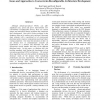Free Online Productivity Tools
i2Speak
i2Symbol
i2OCR
iTex2Img
iWeb2Print
iWeb2Shot
i2Type
iPdf2Split
iPdf2Merge
i2Bopomofo
i2Arabic
i2Style
i2Image
i2PDF
iLatex2Rtf
Sci2ools
105
click to vote
FCCM
2003
IEEE
2003
IEEE
Issues and Approaches to Coarse-Grain Reconfigurable Architecture Development
Although domain-specialized FPGAs can offer significant area, speed and power improvements over conventional reconfigurable devices, there are several unique and unexplored design problems that complicate their development. One source of these problems is that designers often opt to replace more universal, fine-grain logic elements with a specialized set of coarse-grain functional units to improve computation speed and reduce routing complexity. One issue this introduces is that it is not obvious how to simultaneously consider all applications in a domain and determine the most appropriate overall number and ratio of the different functional units. In this paper, we illustrate how this problem manifests itself during the development of an encryption-specialized FPGA architecture. We present three algorithms that solve this problem by balancing the hardware needs of the domain while considering performance and area requirements. We believe these concerns need to be addressed by future ...
Conventional Reconfigurable Devices | FCCM 2003 | Functional Units | Hardware | Reconfigurable Devices |
Related Content
| Added | 04 Jul 2010 |
| Updated | 04 Jul 2010 |
| Type | Conference |
| Year | 2003 |
| Where | FCCM |
| Authors | Kenneth Eguro, Scott Hauck |
Comments (0)

